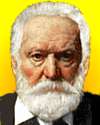 (source)
(source)
|
Victor Hugo
(26 Feb 1802 - 22 May 1885)
French novelist and poet known as one of the greatest French authors, especially for his books The Hunchback of Notre-Dame and his epic historical novel Les Miserables. Beyond his literature, he was a human rights activist, and campaigned to end the death penalty.
|
Science Quotes by Victor Hugo (24 quotes)
[T]he small is great, the great is small; all is in equilibrium in necessity...
— Victor Hugo
Victor Hugo and Charles E. Wilbour (trans.), Les Misérables (1862), 41.
A bit of mould is a pleiad of flowers; a nebula is an ant-hill of stars.
— Victor Hugo
Victor Hugo and Charles E. Wilbour (trans.), Les Misérables (1862), 41.
Algebra applies to the clouds.
— Victor Hugo
Victor Hugo and Charles E. Wilbour (trans.), Les Misérables (1862), 41.
An apple falls in front of Newton, a pot boils before Papin, a flaming sheet of paper floats before the eyes of Montgolfier. At intervals a discovery bursts forth like a mine explosion in the deeps of science, and a whole ledge of prejudice crumbles, and the living rock of truth is suddenly laid bare.
— Victor Hugo
In Victor Hugo and Lorenzo O'Rourke (trans.) Victor Hugo’s Intellectual Autobiography: (Postscriptum de ma vie) (1907), 323-324.
An invasion of armies can be resisted; an invasion of ideas cannot be resisted.
— Victor Hugo
Histoire d’un Crime (written 1851-52, published 1877), conclusion, chap. 10. Trans. T.H. Joyce and Arthur Locker (1886), 413. From the original French: “On résiste à l'invasion des armées; on ne résiste pas à l'invasion des idées.”
Astronomy, that micrography of heaven, is the most magnificent of the sciences. … Astronomy has its clear side and its luminous side; on its clear side it is tinctured with algebra, on its luminous side with poetry.
— Victor Hugo
In Victor Hugo and Lorenzo O’Rourke (trans.) Victor Hugo’s Intellectual Autobiography: (Postscriptum de ma vie) (1907), 237-8. From the original French (1901): “L'astronomie, cette micrographie d'en haut, est la plus magnifique des sciences … L'astronomie a son côté clair et son côté lumineux ; par le côté clair elle trempe dans l'algèbre, par le côté lumineux dans la poésie.” [Note: The published translation had the typo “micography”, which is corrected herein. —Webmaster]
Because a fact seems strange to you, you conclude that it is not one. ... All science, however, commences by being strange. Science is successive. It goes from one wonder to another. It mounts by a ladder. The science of to-day would seem extravagant to the science of a former time. Ptolemy would believe Newton mad.
— Victor Hugo
In Victor Hugo and Lorenzo O'Rourke (trans.) Victor Hugo's Intellectual Autobiography: (Postscriptum de ma vie) (1907), 322.
Black magic and white, sorcery, chiromancy, cartomancy, necromancy, all this is nothing less than science misled, fallen into chimera for lack of responsibility.
— Victor Hugo
In Victor Hugo and Lorenzo O'Rourke (trans.) Victor Hugo's Intellectual Autobiography: (Postscriptum de ma vie) (1907), 322.
Every bird which flies has the thread of the infinite in its claw. Germination includes the hatching of a meteor and the tap of a swallow's bill breaking the egg, and it leads forward the birth of an earth-worm and the advent of Socrates.
— Victor Hugo
Victor Hugo and Charles E. Wilbour (trans.), Les Misérables (1862), 41.
In the vast cosmical changes, the universal life comes and goes in unknown quantities ... sowing an animalcule here, crumbling a star there, oscillating and winding, ... entangling, from the highest to the lowest, all activities in the obscurity of a dizzying mechanism, hanging the flight of an insect upon the movement of the earth... Enormous gearing, whose first motor is the gnat, and whose last wheel is the zodiac.
— Victor Hugo
Victor Hugo and Charles E. Wilbour (trans.), Les Misérables (1862), 41.
It is in the name of Moses that Bellarmin thunderstrikes Galileo; and this great vulgarizer of the great seeker Copernicus, Galileo, the old man of truth, the magian of the heavens, was reduced to repeating on his knees word for word after the inquisitor this formula of shame: “Corde sincera et fide non ficta abjuro maledico et detestor supradictos errores et hereses.” Falsehood put an ass's hood on science.
[With a sincere heart, and of faith unfeigned, I deny by oath, condemn and detest the aforesaid errors and heresies.]
[With a sincere heart, and of faith unfeigned, I deny by oath, condemn and detest the aforesaid errors and heresies.]
— Victor Hugo
In Victor Hugo and Lorenzo O'Rourke (trans.) Victor Hugo's Intellectual Autobiography: (Postscriptum de ma vie) (1907), 313.
It seemed to be a necessary ritual that he should prepare himself for sleep by meditating under the solemnity of the night sky… a mysterious transaction between the infinity of the soul and the infinity of the universe.
— Victor Hugo
From Les Misérables (1862) as translated by Norman Denny in Les Misérables (1980), Vol. 1, 67.
Let poets dream, let artists dream, let philosophers dream: let all thinkers be dreamers.
— Victor Hugo
In 'Promonotorium Somnii', Victor Hugo's Intellectual Autobiography: (Postscriptum de Ma Vie) (1907), 125.
Nothing is really small; whoever is open to the deep penetration of nature knows this.
— Victor Hugo
Victor Hugo and Charles E. Wilbour (trans.), Les Misérables (1862), 41.
Our Milky Way is the dwelling; the nebulae are the city.
— Victor Hugo
In Victor Hugo and Lorenzo O’Rourke (trans.) Victor Hugo’s Intellectual Autobiography: (Post-scriptum de ma vie) (1907), 243. From the original French: “Notre voie lactée est la cabane; les nébuleuses sont la ville.” In 'Choses de l'Infini', Post-scriptum de ma vie (1901), 223. [The French word, “cabane”, can be literally translated as “cabin”. In this context, the sense seems to be of a small dwelling, such as a frontier log cabin, or shack. Note that “nébuleuses” is written in the plural, collectively, to be “the city” in the singular. The preceding sentence is, “Herschel has counted more than two thousand nebulae.” (Technically, our Milky Way galaxy contains nebulae of its own, but in the quote, the nebulae could be regarded as those that exist throughout space beyond our galaxy.) —Webmaster]
Science is continually correcting what it has said. Fertile corrections... science is a ladder... poetry is a winged flight... An artistic masterpiece exists for all time... Dante does not efface Homer.
— Victor Hugo
Quoted in Pierre Biquard, Frederic Joliot-Curie: The Man and his Theories (1961), trans. Geoffrey Strachan (1965), 168.
Science says the first word on everything, and the last word on nothing.
— Victor Hugo
In Victor Hugo and Lorenzo O’Rourke (trans.) Victor Hugo’s Intellectual Autobiography: (Postscriptum de ma vie) (1907), 237.
The word which God has written on the brow of every man is Hope.
— Victor Hugo
Les Miserables. Quoted in Kim Lim (ed.), 1,001 Pearls of Spiritual Wisdom: Words to Enrich, Inspire, and Guide Your Life (2014), 142
There is no supernatural, there is only nature. Nature alone exists and contains all. All is. There is the part of nature that we perceive, and the part of nature that we do not perceive. … If you abandon these facts, beware; charlatans will light upon them, also the imbecile. There is no mean: science, or ignorance. If science does not want these facts, ignorance will take them up. You have refused to enlarge human intelligence, you augment human stupidity. When Laplace withdraws Cagliostro appears.
— Victor Hugo
In Victor Hugo and Lorenzo O'Rourke (trans.) Victor Hugo's Intellectual Autobiography: (Postscriptum de ma vie) (1907), 320.
To sum up all, let it be known that science and religion are two identical words. The learned do not suspect this, no more do the religious. These two words express the two sides of the same fact, which is the infinite. Religion—Science, this is the future of the human mind.
— Victor Hugo
In Victor Hugo and Lorenzo O'Rourke (trans.) Victor Hugo's Intellectual Autobiography: (Postscriptum de ma vie) (1907), 325.
We see past time in a telescope and present time in a microscope. Hence the apparent enormities of the present.
— Victor Hugo
In Victor Hugo and Lorenzo O'Rourke (trans.) Victor Hugo's Intellectual Autobiography: (Postscriptum de ma vie) (1907), 380.
Where the telescope ends, the microscope begins. Which of the two has the grander view?
— Victor Hugo
Victor Hugo and Charles E. Wilbour (trans.), Les Misérables (1862), 41.
Who then can calculate the path of the molecule? how do we know that the creations of worlds are not determined by the fall of grains of sand?
— Victor Hugo
Victor Hugo and Charles E. Wilbour (trans.), Les Misérables (1862), 41.
Who then understands the reciprocal flux and reflux of the infinitely great and the infinitely small, the echoing of causes in the abysses of being, and the avalanches of creation?
— Victor Hugo
Victor Hugo and Charles E. Wilbour (trans.), Les Misérables (1862), 41.
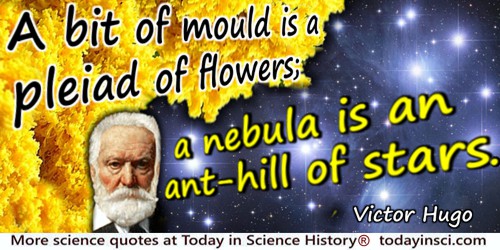


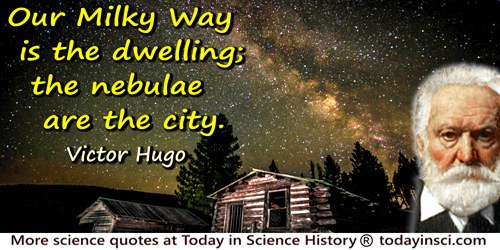
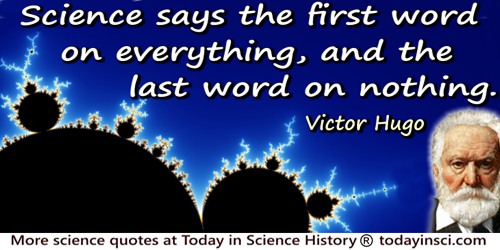
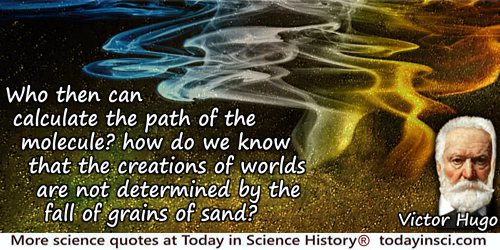
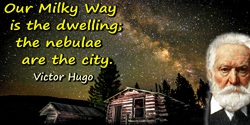
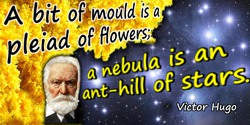
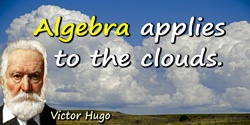
 In science it often happens that scientists say, 'You know that's a really good argument; my position is mistaken,' and then they would actually change their minds and you never hear that old view from them again. They really do it. It doesn't happen as often as it should, because scientists are human and change is sometimes painful. But it happens every day. I cannot recall the last time something like that happened in politics or religion.
(1987) --
In science it often happens that scientists say, 'You know that's a really good argument; my position is mistaken,' and then they would actually change their minds and you never hear that old view from them again. They really do it. It doesn't happen as often as it should, because scientists are human and change is sometimes painful. But it happens every day. I cannot recall the last time something like that happened in politics or religion.
(1987) -- 


